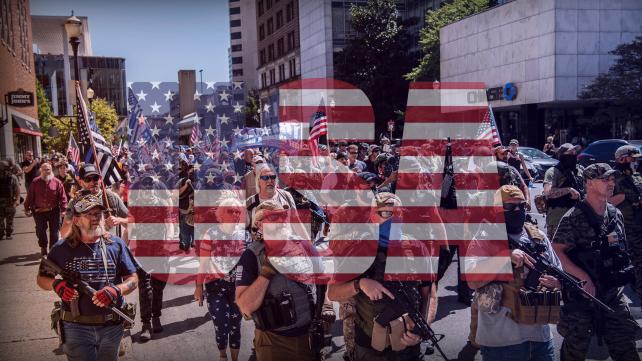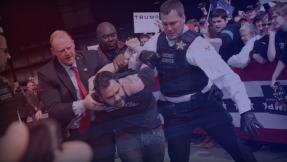
Risk
- Violence is on the rise: Mass shootings hit a record high last year
- FBI data shows all time high of hate crimes in 2018, though the likely number is far higher due to lack of reporting
- This summer saw the largest peaceful protest movement in U.S. history, 95% of protests involve peaceful protestors, but 5% had violence involving property, the police, counter protesters, and/or provocateurs
- Militia activity is on the rise on the left and right. 187 appearances of paramilitary and other far-right actors at rallies nationwide from late May to early July
- Violence behaves like a virus, it is contagious and must be contained to prevent infection
- Four major risk factors linked to possible electoral violence: groups engaging in winner-take-all competition to promote their own interests (“elite factionalization”), societal polarization, rise in hate speech and rhetoric, and weakening institutions
- There is a climate of disinformation designed to further polarize the country
- Pandemic related recession has put over 40 million people out of work
- Perceptions of intimidation, suppression, and fraud can haunt an election’s credibility
Messages
- Acknowledge concerns
- People are not alone in their fears of election violence. 71% of all Americans are concerned about violence in the wake of the 2020 election
- Remember history
- Violence is not effective at achieving long term goals. Research suggests that nonviolent campaigns are more successful for achieving peace and change
- The United States has successfully held elections throughout our nearly 250 years of history, including pandemics, World Wars, and even the Civil War. We’ve done it before and we’ll do it again, as a country
- Find common ground
- Strengthen unifying identities. Focus on shared identities among Americans. For example, 86% of Americans cite their family role as the most important aspect of their identity, 3 of 4 say their American identity is important to them, and 68% are exhausted by the division in our country and see pitting Americans against each other as a threat to our democracy
- The vast majority of Americans reject the use of violence
- Highlight our shared duty to protect our democracy and republic
- Americans agree that voting is a common obligation
- Educate and fight disinformation
- It is likely that we will not know the winner until mid November or even beyond, unlike presidential elections in the recent past. We must be prepare for patience
- Any mistakes and irregularities can be challenged in the courts
- Disinformation, intentionally misleading information, and misinformation, will fill social media. Encourage people to verify before sharing information, and actively seek to correct harmful rumors and conspiracy theories
- Steer discussion of voter fraud and other politicized issues away from “right” and “wrong”. Assure people that there are trusted election officials and established mechanisms to guard against fraud
- A recent government commission and the FBI say voter fraud, including with mail in/absentee ballots, is negligible
- Promote peace and positivity
- Set positive norms, e.g. “violence is not an acceptable way to resolve any issue”
- Invite or encourage others to talk to people in their communities who will be working at the polls
- Reinforce how we all want to make this country better, how there are solutions to the concerns about the election, and how this is an opportunity for us to move forward as a community
- Encourage people to channel their anxiety into civic engagement
Possible Actions
- Take the pledge “With Malice Towards None” organized by Braver Angels
- Consider participating in the “Mourning in Unity” campaign
- Write an op-ed in your local papers counseling calm, patience, peace, and justice
- Share a sermon reinforcing relevant messages with your congregation
- Share relevant messages on social media
https://www.bbc.com/news/world-us-canada-50936575
https://www.asisonline.org/security-management-magazine/articles/2020/02/violent-hate-crimes-reach-16-year-high-in-united-states/ https://www.nytimes.com/interactive/2020/07/03/us/george-floyd-protests-crowd-size.html
https://acleddata.com/2020/09/03/demonstrations-political-violence-in-america-new-data-for-summer-2020/
https://www.cnn.com/2020/08/30/politics/vigilante-group-activity-kenosha/index.html
https://cvg.org/the-big-idea/
https://www.newamerica.org/political-reform/policy-papers/building-us-resilience-political-violence/
https://comprop.oii.ox.ac.uk/research/ira-political-polarization/
https://www.nytimes.com/2020/05/28/business/economy/coronavirus-unemployment-claims.html
https://www.nytimes.com/2020/09/30/us/trump-election-poll-watchers.html
https://democracyforpresident.com/topics/election-violence
https://democracyforpresident.com/topics/communication-2020-election-results
www.cartercenter.org/vote
https://apnews.com/article/f5f6a73b2af546ee97816bb35e82c18d





Add new comment